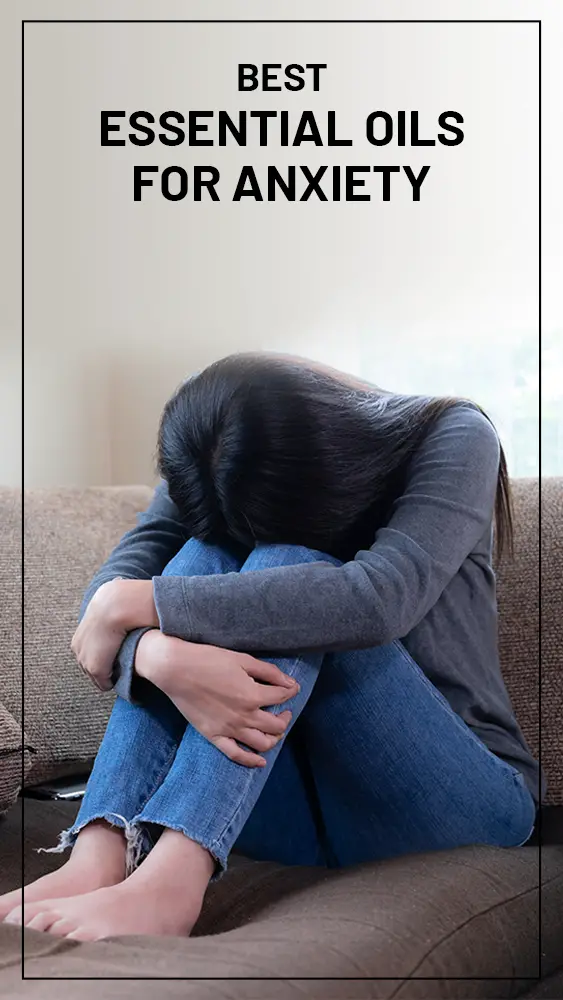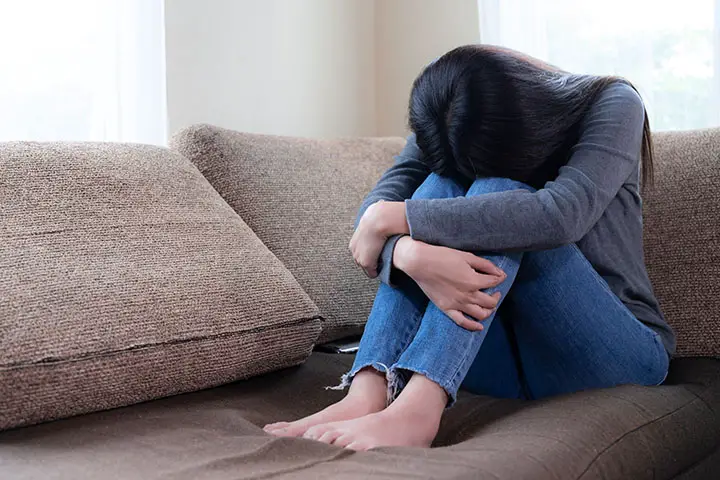
Important: This article is for informational purposes only. Please read our full disclaimer for more details.
Right before a meeting with the boss, you feel a knot in your tummy and fight the urge to pee. Being on stage with a mic in your hand reduces you to a pool of sweat. Do you have these episodes often? If yes, it’s time for you to take anxiety seriously. Fear of facing the public, panic attacks, sweaty palms, dry mouth, urge to pee, shivering legs, fumbling speech, worry, dizziness, and sometimes losing consciousness can all happen because of anxiety. Oh! Marriage, relationships, and spouses can give you anxiety too!
Though we casually dismiss it, anxiety is not an uncommon phenomenon anymore. About 18.1% of the world’s population deals with anxiety every day! And how do we treat it? Just by popping a few antidepressants, anxiolytic drugs (like benzodiazepines), or sleeping pills? Did you ever think of essential oils as a solution? You’ll know how potent essential oils are in treating anxiety.
Best Essential oils for Relieving Anxiety
Essential oils stimulate your senses when they get absorbed by your body or when you inhale them. When you inhale fragrances in the atmosphere through your nose, the olfactory receptors get activated. These receptors interact with specific proteins that open or close the ion channels of your brain lobes, while the olfactory cortex recognizes the odors and associates them with memories.
Depending on the type of odor – pleasant or unpleasant – different centers in your brain get activated by the signals sent through the olfactory sensory neurons. So, you could either feel alert or dull when you inhale certain fragrances. For instance, lavender oil increases drowsiness while rosemary increases alertness. Chocolate fragrance reduces the level of attention while jasmine oil increases the feeling of well-being, freshness, and romance.
Taking advantage of the stimulating effect fragrances have on our brain and body functions, we can manage anxiety and related symptoms effectively. Here are a list of the most effective essential oils for relieving anxiety.
[ Recommended: How to Take Ashwagandha for Anxiety & Depression ]
1. Lavender oil
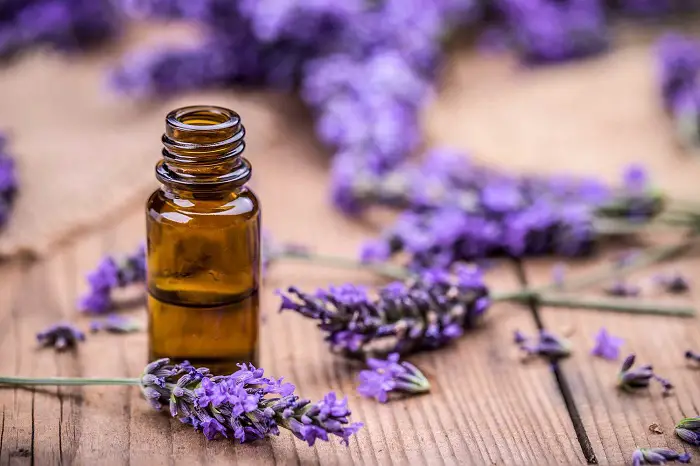
- The essential oil of lavender (Lavandula angustifolia) has antibacterial, antifungal, anxiolytic, antidepressant, analgesic, carminative (smooth-muscle relaxant), and vulnerary effects. Wow!
- Traditional and folk medicine use lavender oil for reducing anxiety and depression. This has been supported recently by clinical data.
- Lavender essential oil has concentrated lipophilic extracts of terpenoid constituents, such as linalool and linalyl acetate, which can penetrate the cell membranes and act on specific activity centers.
- What’s best is lavender oil has almost no side effects and can be used for topical application, inhalation, and ingestion.
2. Ylang-Ylang oil
- Cananga odorata is a plant that has sweet-smelling flowers, and that’s where you get the essential oil from.
- Research shows that inhaling or massaging with ylang-ylang oil significantly reduces signs of anxiety like increased heart rate, sweating, and body temperature.
- It reduces the serum cortisol and blood pressure levels in stressed individuals upon inhalation. But, there are cases in which topical application has resulted in irritation.
[ Recommended: How is Valerian Root Used for Anxiety ]
3. Sweet Orange oil
- Sweet orange oil (Citrus sinensis) is one of the well-known essential oils. This fragrance has been used in various cosmetics for a pleasant and fresh feel.
- The oil has bioactive molecules like limonene that diffuse into your blood rapidly via the lungs. These molecules activate your brain (limbic system) and regulate the cortisol levels, decreasing anxiety.
- Research backs the application of sweet orange oil as an anxiolytic agent to combat stress and hypertension. Sweet orange oil can be used (inhaled, applied topically, or massaged) to reduce anxiety arising in situations like labor, surgeries, dental procedures, and depression.
4. Rose Essential oil
- Rose oil is obtained from the petals of different Rosa species, especially Rosa centifolia L. and Rosa damascena Mill. The most abundant components of rose oil are terpene alcohols like citronellol, geraniol, and nerol.
- Due to the phytochemical composition of rose oil, it can reduce anxiety and depression and many other conditions. It is mixed with a variety of essential oils to create a relaxing effect on your body and mind.
- Rose oil can reduce palpitations, blood pressure, and breathing rate, thereby calming you down. Apart from inhaling it, you can also use it in massage oils for topical application.
[ Recommended: Yoga Poses to Relieve Anxiety ]
5. Frankincense oil
- Frankincense oil is extracted from the resin of the Boswellia species trees and has great therapeutic value because of its biochemical constitution. Traditional medicine in the East claims this oil to be anti-inflammatory, antiseptic, anxiolytic, tranquilizing, and antidepressant.
- Frankincense oil has bioactive components, such as pinene, thujene, camphene, cymene, limonene, octyl acetate, and several mono- and diterpenoids.
- Using frankincense oil in aromatherapy increases sleep, reduces anxiety, stabilizes hypertension, and gives a mild, warm sensation to your skin along with strong positive vibes because of its pleasant odor.
- Frankincense oil stimulates your brain’s limbic system – especially the amygdala and hippocampus – which are related to emotional behavior and memory. Perhaps that’s why it is used in rituals and religious functions as incense.
6. Chamomile oil
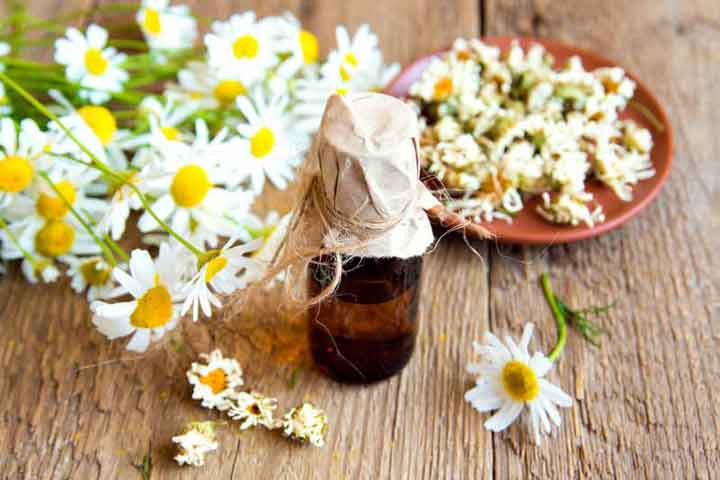
- The beautiful chamomile flower and various parts of its plant are used to make this essential oil.
- Chamomile essential oil contains terpenoids, particularly sesquiterpenes (alpha-bisabolol, chamazulene, and bisabolol oxides) and esters (isobutyl angelate, 2-methylbutyl angelate, and isoamyl angelate).
- All these components together work on your body when you inhale it or massage it into your skin.
7. Bergamot oil
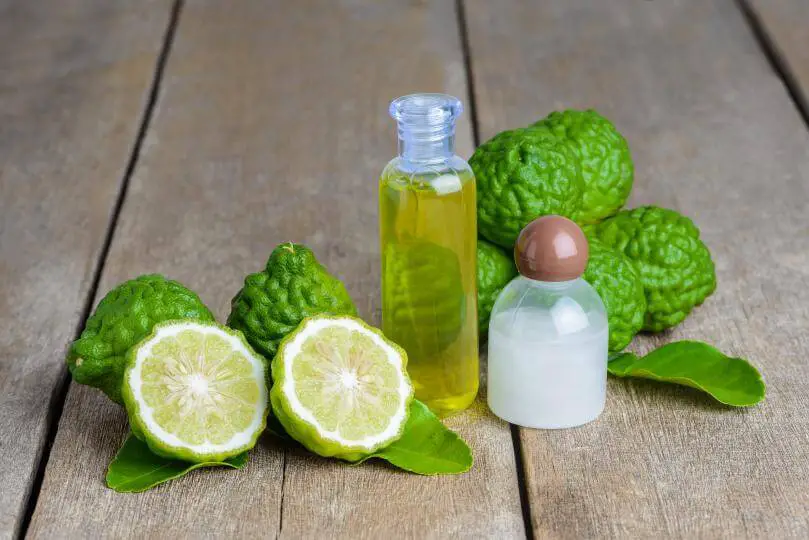
- Bergamot essential oil is extracted from Citrus bergamia peels and is an instant mood booster.
- This oil contains limonene, myrcene, pinene, linalool, and citral in its volatile fraction, and pigments, waxes, coumarins, and bergamottin in its non-volatile fraction.
- These active compounds in bergamot oil affect the central nervous system. The oil also has analgesic, anti-inflammatory, antimicrobial, and antiproliferative properties but is unstable in heat.
- Though it is safe to inhale, the photosensitivity and phototoxicity of bergamot oil make it unsuitable for topical application.
8. Geranium Essential oil
- Apart from its pleasant aroma, geranium essential oil has anti-inflammatory, antidepressant, sedative, anxiolytic, and muscle-relaxing properties.
- Geranium oil, derived from the plant Pelargonium graveolens, also facilitates blood circulation and eases breathing.
- This essential oil is one of the most effective herbal essences for reducing menstrual-related anxiety. Inhaling geranium oil during labor and postpartum works wonders in reducing anxiety and hypertension.
Note: The topical application of geranium oil might cause skin irritation and cross-reactions. So, preferable mode of usage is inhalation- mix it with carrier oil and add it to oil diffusers.
How To Use Essential oils To Calm Anxiety
Essential oils are used in two ways
i. Inhalation:
- You can add essential oils to oil diffusers so that their fragrance and active ingredients are spread in the environment surrounding you.
- Try using them in place of room fresheners, pillow mists, bathroom fresheners, and incense sticks.
ii. Topical Application:
- The critical step here is to mix the essential oils in carrier oils because the former are highly concentrated extracts.
- Oils of almonds, jojoba, olive, coconut, castor, sesame, canola (rapeseed), grapefruit, argan, and avocado can be used to dilute these essential oils.
Note: Some oils can irritate your skin despite being diluted. Read and follow the instructions carefully or consult your doctor before applying them.
Using essential oils for anxiety will also help you improve cognition, learning, memory, immunity, and various aspects of your physical and mental health. They are also great solace for your mind and soul.
Also, Read:
- 7 Best Essential Oils For Hair Growth
- The 10 Best Essential Oils for Depression
- 10 Best Essential Oils for Headaches
- 8 Essential Oils for Sore Muscle Pain Relief
- 8 Essential Oils for Migraine Pain Relief | How To Use It
- 15 Best Essential Oils for Cough: Benefits & How to Use
- 10 Best Essential Oils for Headaches
- Essential Oils for Hair Loss: Benefits and How to Use
- 7 Best Essential Oils for Eczema Treatment
- 10 Calming Essential Oils for Relaxation
- 10 Essential Oils That Can Help You Get Rid of Nausea
